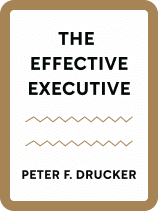

This article is an excerpt from the Shortform book guide to "The Effective Executive" by Peter F. Drucker. Shortform has the world's best summaries and analyses of books you should be reading.
Like this article? Sign up for a free trial here .
Is Peter Drucker’s The Effective Executive worth reading? How does the author define effectiveness?
The Effective Executive, a 1966 classic by management expert Peter F. Drucker, explains how to manage yourself to be effective. He defines effectiveness as choosing and doing the right things—that is, the things that significantly improve personal and organizational performance.
This The Effective Executive book review takes a look at the book’s context, background, and critical reception by the readers.
About the Author
Drucker, who died in 2005, is referred to as the founder of modern management. A leader in management theory and practice for over 60 years, he authored 39 books and countless articles, including more than 30 essays in the Harvard Business Review.
Drucker was born in Austria, received a doctoral degree in Frankfurt, and worked as a reporter in Germany before fleeing to England upon Hitler’s rise to power. He moved to the U.S. in 1937, later becoming a citizen, and taught at New York University and Claremont Graduate University, among other institutions.
In 1939, he published his first book, The End of Economic Man, an examination of totalitarianism that influenced Winston Churchill. He began writing about management with Concept of the Corporation in 1946, about his study of General Motors (GM). He followed up with The Practice of Management (1954), Managing for Results (1964), Drucker on Management (1971), and many more works. He continued to write books and articles into the early 2000s.
President George W. Bush awarded Drucker the Presidential Medal of Freedom in 2002 for his contributions to management theory. Drucker’s obituary in the New York Times noted that his ideas on management were so influential that a comment from him could change the way top corporate leaders operated.
The Book’s Publication
Published in 1967, The Effective Executive: The Definitive Guide to Getting the Right Things Done was Drucker’s eighth book.
The Effective Executive and other Drucker books are published by HarperCollins and Routledge. USA Today listed it as one of the 12 best business books of all time, and it continues to get regular reviews on Amazon and GoodReads 55 years after publication.
In 2006, Drucker and Joseph Maciariello wrote a follow-up book, The Effective Executive in Action: A Journal for Getting the Right Things Done which contains journaling prompts and other activities based on Drucker’s ideas.
Historical Context
In an author’s note in the 2002 HarperBusiness Essentials edition of The Effective Executive, Drucker wrote that he originally developed the ideas in the book as a program for senior officials in the Eisenhower administration. But the concepts still apply to all kinds of executives, knowledge workers, and organizations, including nonprofits.
Intellectual Context
Drucker was a wide-ranging and prescient thinker. For example, he recognized the rise of the information society. He also coined the term knowledge worker, recognizing the economic transition from manual workers to professionals who independently apply analytical knowledge and creativity to solve complex problems or to develop products and services.
His understanding of the knowledge worker informed his ideas about what makes a leader, or anyone tasked with independent thinking and decision-making, effective. In The Effective Executive and further writing, he described how leaders should manage knowledge workers differently from task workers and how both can get better results for the organization.
The Book’s Impact
Drucker’s ideas helped shape the corporation as we know it. He developed the concept of MBOs, or management by objectives, in the 1950s, a forerunner of today’s OKRs (Objectives and Key Results). He was a leader in the development of management education, having started one of the nation’s first executive MBA programs. Drucker also understood the importance of decentralization, strategic planning, innovation, marketing, and customer service.
In addition to inspiring the widespread adoption of MBOs and other business practices, Drucker’s work served as the foundation for countless leadership and personal development books and training programs. For example, his ideas on time blocking and prioritizing in The Effective Executive inspired contemporary time management practices.
Drucker’s ideas about effectiveness and management have continued to influence business leaders and authors—for example, the late Jack Welch, Tom Peters, Jim Collins (Good to Great), Ken Blanchard, Andrew Grove (High Output Management), Jeff Bezos, Stephen Covey (The 7 Habits of Highly Effective People and First Things First) and Tim Ferriss (The 4-Hour Workweek). In an article on his website, Collins discusses 10 lessons learned from Drucker—for instance, determine the most distinctive contribution you can make to your organization, and focus on making it.
Others look for answers to contemporary issues in Drucker’s work. Harvard Business School researcher and management theorist Rosabeth Moss Kantor wrote several HBR articles (including What would Peter say?) on how Drucker might have viewed challenges such as climate change and health care, excessive executive pay, and competition from emerging markets.
The Book’s Critical Reception
The fact that so many people have adopted and built on Drucker’s ideas about effectiveness and management over decades—despite the sea changes in technology and organizations since he started writing about business—is a testament to their enduring value and utility. As noted earlier, The Effective Executive continues to get online reviews from contemporary readers who cite the ideas’ practicality. The main criticism is that Drucker’s language and writing style are “dated,” or that the ideas are “nothing new,” notwithstanding the fact that they are foundational.
Specifically, Drucker’s books have come in for little criticism—although overall, he’s been criticized for being more of a popular writer and generalist than a scholar and for being more practical than theoretical. Many of his ideas have simply become the way businesses are run. (For example, a 2009 Harvard Business Review article, “Why Read Peter Drucker?”, describes his ideas as part of “today’s commonsense understanding of business.”)
Explore Drucker’s Ideas
- Websites
Commentary on the Book’s Approach
Drucker’s overall theme was that organizations—corporations, governments, and nonprofits—are critical to the smooth functioning of society, and thus they have a social responsibility beyond goals such as making a profit. Executives who improve their effectiveness at getting results improve themselves, their organizations, and the greater world.
The Effective Executive explains management nut-and-bolts, such as prioritizing, time management, handling meetings, and making decisions. These ideas weren’t widely appreciated or practiced at the time of the book’s writing, but have since become popular, ongoing topics of books and articles. As a forerunner, this book offers time-tested strategies for effectiveness without the buzzwords and acronyms created for them by later authors.
The Effective Executive’s practical tips are useful for people new to management or new to their positions. Drucker also felt they applied to the then-emerging knowledge workers, because he realized their work significantly affected organizational performance. Their work is even more critical decades later—in Management Challenges for the 21st Century published in 1999, he called knowledge workers and their productivity “the most valuable asset of a 21st-century institution.” So this book still speaks to an ongoing challenge of, as Drucker put it, learning to manage yourself.
Commentary on the Book’s Organization
After an introduction discussing the meaning of effectiveness, business evolution, and the rise of knowledge workers, Drucker devotes a chapter to each of five practices for effectiveness: managing your time, focusing on just a few key tasks, making your unique contribution, maximizing your strengths, and making sound decisions. His presentation is straightforward, although the lengthy examples and language are now dated.

———End of Preview———
Like what you just read? Read the rest of the world's best book summary and analysis of Peter F. Drucker's "The Effective Executive" at Shortform .
Here's what you'll find in our full The Effective Executive summary :
- How to manage yourself before you can manage others
- The five practices that anyone can learn to be more effective
- Why leaders should purposely create disagreements






